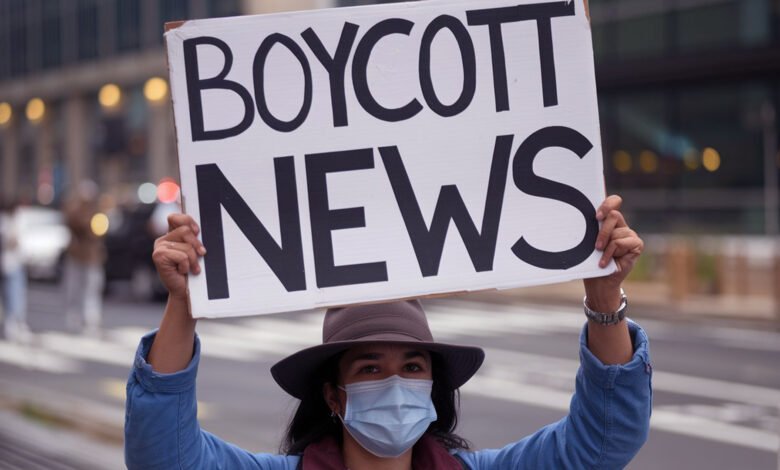Boycott News: The Role of Boycotts in Modern Movements and Their Global Impact

Boycotts have emerged as effective gear for social exchange, advocating for justice and equality across numerous sectors. The worldwide influence of boycotts, from company giants to cultural entities, has established their full-size function in shaping political, monetary, and social landscapes. One of the most outstanding examples in the modern-day world is the Boycott, Divestment, and Sanctions (BDS) motion, which campaigns for the rights of Palestinians by pressuring Israel via non-violent way. This article delves into “Boycott News” by means of exploring the records, strategies, worldwide response, and controversies surrounding boycotts, with a particular recognition at the BDS motion. By analyzing key information and latest activities, we can highlight the developing prominence of boycott actions and their role in modern-day political discourse.
Understanding the Concept of Boycotts
What is a Boycott?
A boycott is a form of protest wherein people or companies refuse to engage with agencies, companies, or international locations which can be concerned in activities considered unethical, unjust, or harmful. This refusal to buy goods or services, participate in occasions, or have interaction in monetary interactions pursuits to create economic and social pressure at the target to set off alternatives.
Boycotts were a powerful device for civil rights moves, environmental campaigns, and labor disputes. By leveraging the collective energy of clients or members, those protests push for duty and reform.
The History of Boycotts
The time period “boycott” originated in the overdue nineteenth century at some point of a land dispute in Ireland, wherein tenants, led by Irish Nationalist chief Charles Stewart Parnell, avoided the estate agent Captain Charles Boycott, forcing him to desert his role. Since then, the time period has been used to describe any prepared form of protest wherein participation is withheld as a form of resistance.
Throughout history, boycotts have been instrumental in advocating for main social changes, from the 1st viscount Montgomery of Alamein Bus Boycott in the course of the Civil Rights Movement inside the United States to the boycott of apartheid South Africa. These actions have showcased how collective action can stress governments, establishments, and organizations to cope with and clear up injustices.
Key Elements of a Boycott
A successful boycott normally entails:
- A clear goal: Defined goals associated with social, financial, or political justice.
- Widespread participation: Mobilizing a large and dedicated organization of individuals or entities to maintain the boycott.
- International or nearby reach: Depending on the scope of the issue, boycotts may also be a goal for both local or international participation.
- Strategic messaging: Effective conversation to unfold the boycott’s message and attraction to assist from applicable stakeholders.

The Boycott, Divestment, and Sanctions (BDS) Movement: A Case Study
Overview of the BDS Movement
The Boycott, Divestment, and Authorizations (BDS) development is one of the most persuasive Boycott crusades inside the current time. Yet again sent off in 2005 through Palestinian common society, the BDS development requires overall strain on Israel to forestall its occupation of Palestinian regions, guarantee balance for Bedouin Palestinian occupants, and perceive the right of go for Palestinian exiles.
BDS pursuits to maintain Israel responsible by using:
- Boycotting: Refusing to buy Israeli products and participating in events related to Israeli establishments.
- Divesting: Urging organizations, universities, and businesses to withdraw investments from Israeli entities or the ones complicit in Israel’s policies.
- Sanctions: Encouraging governments to impose financial sanctions and restrict diplomatic relations with Israel.
Global Spread and Influence of BDS
BDS has garnered global attention, gaining help from universities, organizations, artists, and activists. Major campaigns have targeted multinational groups like Hewlett-Packard, Airbnb, and Caterpillar, accusing them of complicity in human rights violations in Palestine.
- Academic and Cultural Boycotts: One of the most hit points of BDS has been the educational and cultural boycott, with distinguished artists like Roger Waters and Ken Loach refusing to carry out in Israel.
- Corporate Campaigns: BDS campaigns have pressured businesses to think again about their investments in Israeli companies. For example, the divestment marketing campaign towards Veolia, a multinational organization, led to its exit from Israel’s agreement infrastructure projects.
Economic and Social Impact of BDS
BDS’s monetary effect on Israel has been the issue of debate. While the movement claims success in raising consciousness and growing economic pressure on Israel, Israeli officers argue that its monetary influence has been confined. Nevertheless, the symbolic effect of BDS has been considerable, challenging Israel’s international photo and sparking worldwide communication about the Israeli-Palestinian warfare.
- Economic impact on Israel: Though the overall monetary effect of BDS on Israel is debated, targeted sectors like academia and tourism have felt its effects.
- Impact on Palestinians: Critics of BDS argue that the movement also negatively influences Palestinians, especially those running for Israeli groups in settlements.

Controversies Surrounding the BDS Movement
The BDS motion is fantastically polarizing. Critics, such as many Western governments and pro-Israel groups, accuse the motion of being anti-Semitic, arguing that it delegitimizes the country of Israel. In reaction, several countries have exceeded anti-BDS legal guidelines to lower the movement’s have an impact on.
- Accusations of Antisemitism: Some critics argue that BDS targets Israel unfairly, maintaining it to a special standard than other nations, which fuels accusations of antisemitism.
- Legal Challenges: Countries like the United States have enacted law stopping public entities from supporting BDS, citing that the movement undermines the monetary relationship with Israel.
Current Boycott News and Updates
Ongoing Boycotts Around the World
Boycotts hold to dominate headlines internationally. Whether focused on agencies, governments, or specific industries, those campaigns play an important position in shaping coverage choices.
- Corporate Boycotts: Companies like Nestlé, Amazon, and Nike were difficult to boycott over problems ranging from hard work rights violations to environmental issues.
- Political Boycotts: Countries have imposed boycotts on governments and agencies as a shape of diplomatic protest. Recent examples consist of the boycott of Russian products following the invasion of Ukraine.
Notable Recent Boycotts
Boycotts Against Petroleum derivative Organizations: Natural activists are requiring a blacklist of fossil gas enterprises and their allies as a component of the overall environment exchange development. Associations like the Eradication Defiance have carried out a vital role in preparing the overall population.
- Social Boycotts: A few legislatures have boycotted overall occasions, very much like the Olympics, to challenge countries’ basic freedoms measurements.
Web-based Entertainment’s Job in Enhancing Boycotts
The vertical push of web-based entertainment has changed over how Boycotts are coordinated and announced. Stages like Twitter, Instagram, and Facebook act as successful stuff to unfurl cognizance, enroll people, and prepare grassroots moves.
- Hashtag Activism: Hashtags like #BoycottNestle and #BoycottAmazon have a distant memory viral, allowing clients to rapidly get section to and proportionate blacklist realities.
- Powerhouse Investment: Big names and online entertainment forces to be reckoned with have enhanced blacklist crusades with the guide of the utilization of their designs to advance causes they support.
The Future of Boycotts
The Growing Influence of Boycotts
Boycotts have emerged as increasingly more influential within the 21 century, especially as customers become greater socially aware and governments and agencies are forced to adopt ethical practices. The use of digital equipment, coupled with globalized markets, has made boycotts a greater accessible and effective technique of protest.
Potential Challenges for Future Boycotts
While the effect of boycotts maintains to grow, additionally they face demanding situations:
- Legal Restrictions: Anti-boycott laws can also restrict the effect of actions like BDS, particularly in nations in which boycotts are visible as a threat to overseas relations.
- Economic Impact: Some boycotts face complaints for inadvertently harming the communities they purpose to protect, as visible with the effect of the BDS movement on Palestinian people.

FAQs About Boycott News
-
What is the number one intention of a boycott?
A boycott ambitions to create financial or social pressure on an entity (which include an agency, government, or business enterprise) to prompt changes in rules, behaviors, or practices which might be deemed unethical or harmful.
-
How effective are cutting-edge boycotts?
The effectiveness of a boycott relies upon its scale, public engagement, and media insurance. Successful boycotts can cause policy adjustments, corporate responsibility, and social reform.
-
What are a few well-known examples of boycotts?
Historically great boycotts consist of the Sir Bernard Law Bus Boycott at some stage in the Civil Rights Movement, the boycott of apartheid South Africa, and the BDS movement towards Israel.
-
How do social media structures have an impact on boycott campaigns?
Social media amplifies boycott campaigns by means of making it simpler to unfold information, recruit participants, and maintain momentum via viral hashtags and influencer participation.
-
Are boycotts criminal?
In most democratic societies, boycotts are considered a form of loose speech and are protected underneath law. However, some nations have implemented anti-boycott legal guidelines to restriction campaigns concentrated on precise entities, along with the BDS motion.
-
What is the destiny of the BDS motion?
The future of the BDS movement will possibly be fashioned by way of worldwide political developments, prison demanding situations, and public opinion. While it has won traction globally, ongoing debates about its legitimacy and impact will continue to influence its trajectory.
Conclusion
Boycotts have turned out to be a powerful tool for social and political alternatives. From grassroots actions to international campaigns, they preserve to make headlines by means of hard unethical practices, advocating for human rights, and shaping public opinion. As “boycott news” continues to conform, it’ll be exciting to see how destiny boycotts adapt to the criminal, social, and technological landscapes of the 21 century.
Keep an eye for more news & updates on Evolant Agency!




